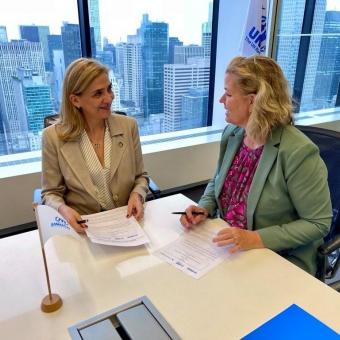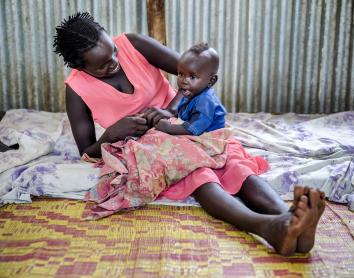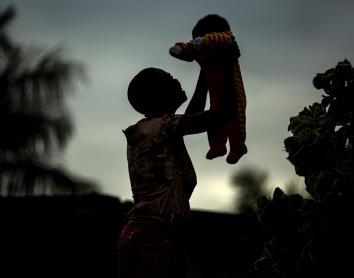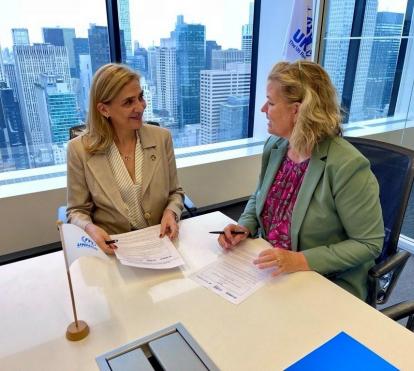
The ”la Caixa” Foundation and UNHCR reaffirm their commitment to maternal and child health
25.09.25
4 minutes readUNHCR, the UN Refugee Agency and the ”la Caixa” Foundation have
reaffirmed their long-standing partnership to support refugee communities in
Ethiopia, one of Africa’s largest refugee-hosting countries. As part of this
renewed collaboration, the ”la Caixa” Foundation will continue its
support for the Moments of Motherhood (MOM) Project - a flagship initiative
that has transformed health outcomes for refugee mothers and children since its
inception 2017.
The MOM Project is a comprehensive initiative to improve maternal and child health among refugee communities in Ethiopia.
The project promotes effective nutrition and health strategies across all humanitarian sectors. It addresses severe acute malnutrition and takes innovative approaches such as training mothers in early detection, engaging communities in nutritional care, and deploying digital tools for monitoring and evaluation.
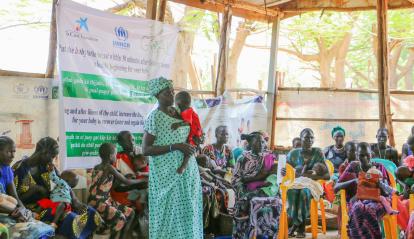
Operating in Ethiopia - a country at the heart of the Horn of Africa facing a prolonged and severe drought, compounded by a sharp rise in refugee arrivals from famine- and conflict-affected regions such as South Sudan and Somalia - the MOM Project responds to a critical humanitarian emergency. Each year, more than 200,000 people, primarily mothers and children, benefit from the programme’s interventions.
So far, the MOM Project has reached over 1.7 million people in refugee camps in Gambella and Melkadida-Dollo Ado, achieving: 92 per cent recovery rates for children treated for malnutrition, a 50 per cent reduction in severe acute malnutrition and a 29 per cent drop in infant mortality rate.
The MOM Project offers a holistic set of interventions to improve nutrition and early childhood development among refugee families. These include cash-based assistance for fresh food purchases, safe spaces for mothers and fathers to learn about breastfeeding and infant feeding, community awareness campaigns, cooking workshops, and home gardening support. The programme also provides nutritional centres for prevention and treatment of malnutrition, and baby-friendly spaces that promote healthy cognitive development through play, interaction, and audiovisual learning.
The programme also provides nutritional centres for prevention and treatment of malnutrition, and baby-friendly spaces that promote healthy cognitive development through play, interaction, and audiovisual learning.
For Nyajouk Chany, a participating mother from the Tierkidi refugee camp, the MOM programme has been a turning point. “Before we were admitted to this programme, my baby was suffering a lot. My body wasn't producing enough breast milk because I wasn't eating enough. But since we were admitted, everything has improved. We are receiving adequate nutrition, and my baby has improved. He is receiving medication to treat his illness and is recovering,” she explained.
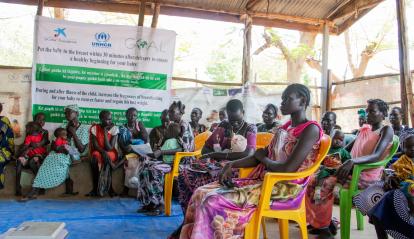
“Now we are waiting for him to be discharged so we can go home. If I return to South Sudan, I will put into practice all the knowledge I have gained through this programme because I have learned a lot. Thanks to this knowledge, I will be able to generate income by farming the land”, Nyajouk added.
For mothers, MOM also means self-sufficiency. In the programme, they receive training in agriculture and nutrition so they can improve their diets and those of their families, helping to save lives, as well as providing new livelihoods.
“Our collaboration through the MOM project has been nothing short of transformative. This partnership shows what’s possible when the private sector and humanitarian actors come together with purpose”, said Kelly T. Clements, UNHCR Deputy High Commissioner. “Huge thanks to ”la Caixa” for their continued support. We’re excited to keep building on this work and to keep putting people at the heart of everything we do.”
The ”la Caixa” Foundationis UNHCR’s longest-standing private sector partner in Spain and has supported the MOM Project from the very beginning.
“We recognize the urgent humanitarian challenges posed by conflict, climate change, and insecurity. This partnership with UNHCR reflects our commitment to improving refugee lives, especially children, through innovative solutions. The private sector must lead not only with funding, but also with advocacy and shared knowledge,” said HRH the Infanta Cristina, director of the Internacional Area at the ”la Caixa” Foundation.
Ethiopia currently hosts more than 1 million refugees, primarily from South Sudan, Somalia, Eritrea, and Sudan. Women and children make up the majority of the displaced population, many of whom face heightened risks during pregnancy and early childhood.
